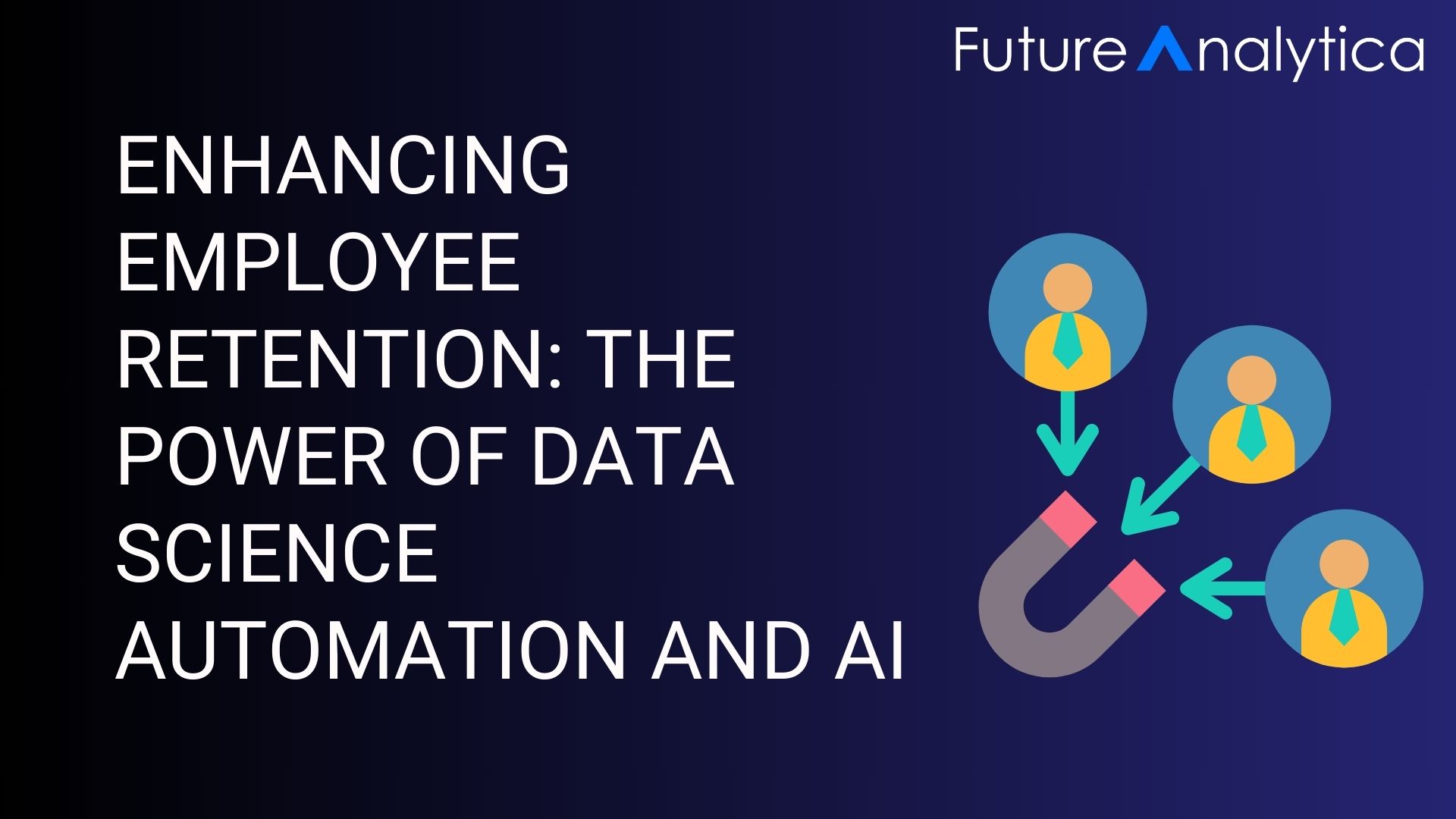Enhancing Employee Retention: The Power of Data Science Automation and AI

In the contemporary business landscape, retaining top talent has become a paramount challenge for HR professionals and business leaders across industries. The dynamic nature of the workforce, coupled with evolving employee expectations, has made employee retention an intricate puzzle to solve. However, the advent of Artificial Intelligence (AI) and data science automation presents a revolutionary approach to enhancing employee retention strategies. This article delves into the transformative potential of integrating AI and data science automation into employee retention efforts, with a spotlight on the capabilities and benefits of Future Analytica’s platform.
Introduction
Employee retention is a critical concern for organizations aiming to maintain a competitive edge. High turnover rates not only incur financial costs but also impact organizational culture and productivity. In this context, AI and data science automation emerge as game-changers, offering predictive insights and personalized strategies to keep employees engaged and committed.
The Cost of Employee Turnover
The repercussions of employee turnover extend beyond mere financial losses. Replacing an employee can cost up to twice the employee’s annual salary when considering recruitment, training, and the loss of institutional knowledge. Moreover, high turnover rates can erode company culture and morale, making it imperative for organizations to adopt proactive and predictive retention strategies.
The Role of Data Science Automation in Employee Retention
Data science automation involves using machine learning algorithms and predictive analytics to process and analyze large volumes of data. In the context of employee retention, it can provide HR professionals with actionable insights into the factors that contribute to employee turnover.
Predictive Analytics for Churn Prediction
One of the most powerful applications of data science automation is in predicting employee churn. By analyzing historical data on employee behavior, performance, and engagement, predictive models can identify patterns that are indicative of an increased likelihood of an employee leaving the company. These models can take into account a wide range of variables, from job satisfaction and team dynamics to workload and recognition.
Personalized Retention Strategies
With the insights gained from data science automation, HR teams can develop personalized retention strategies. For example, if the data indicates that employees with certain skill sets or in specific roles are more prone to leaving, targeted interventions can be designed to address their unique needs and concerns.
Real-Time Data Processing
Data science automation enables real-time processing of data, which means that HR teams can quickly identify and respond to potential retention issues as they arise. This agility is crucial in today’s fast-paced work environment, where employee sentiments and market dynamics can shift rapidly.
Success Stories of Data Science Automation
Several companies have successfully implemented data science automation to improve their retention rates. For instance, a global tech company used predictive analytics to identify at-risk employees and developed tailored retention programs that led to a significant reduction in turnover. Another organization leveraged machine learning to analyze employee feedback in real-time, allowing them to address concerns promptly and improve overall employee satisfaction.
Implementing Data Science Automation
To implement data science automation for employee retention, organizations should start by identifying the key metrics and data sources that are most relevant to their workforce. They should then invest in the right tools and platforms that can automate the data analysis process. It’s also important to have a skilled team that can interpret the data and translate it into effective retention strategies.
Introducing Future Analytica
Future Analytica stands at the forefront of this technological revolution, offering an automated machine learning platform that provides end-to-end data science and AI support for enterprises. The platform’s unique features, including ISO/IEC 27701:2019 and ISO 27001 certifications, and its modular approach, ensure scalability and custom functionality tailored to each organization’s needs.
Why Data Science Automation with Future Analytica?
Automating the data science process with Future Analytica brings about numerous benefits. It allows HR teams to save significant time and focus on value-driven use cases. By automating model building, deployment, and management, Future Analytica leads to up to 95% effort reduction, empowering HR professionals to leverage predictive analytics for informed decision-making.
Predictive Analytics for Employee Retention
Future Analytica’s platform enables organizations to predict employee churn by analyzing patterns in performance, engagement, and other relevant data. These predictive insights are crucial for developing personalized retention strategies that address individual employee needs and preferences, thereby enhancing overall retention rates.
Success Stories and Case Studies
Although specific success stories and case studies are anonymized, it’s evident that organizations leveraging Future Analytica have seen remarkable improvements in their retention rates. By integrating predictive analytics into their HR strategies, these organizations have been able to identify at-risk employees early and take targeted actions to retain them.
Implementing Future Analytica in Your Organization
Implementing Future Analytica begins with identifying valuable AI use cases relevant to your organization’s HR challenges. The platform’s agile AI pilot capabilities ensure success in 45 days or less, allowing for seamless integration of AI models with business workflows for real-time results. This step-by-step approach ensures that organizations can effectively leverage AI to enhance their employee retention strategies.
Ethical Considerations and Best Practices
The ethical use of employee data is paramount. Future Analytica is committed to data security, privacy, and adherence to regulatory standards, ensuring that all data is handled with the utmost care. Organizations must also consider ethical implications and best practices when implementing AI in HR, ensuring transparency and fairness in all processes.
Conclusion
The integration of AI and data science automation into employee retention strategies offers a promising avenue for HR professionals and business leaders. Future Analytica’s platform, with its predictive analytics capabilities and ethical commitment, stands as a testament to the transformative potential of technology in enhancing employee retention.